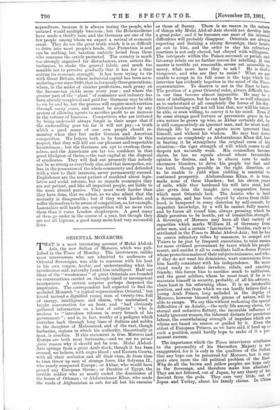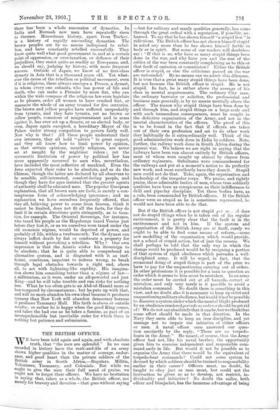ORIENTAL MONARCHS.
MHAT is a most interesting account, A Mulai Aziz, the new Sultan of Morocco, which was pub- lished in the Times of Monday. The interviewer, Unlike most interviewers who are admitted to audiences of Oriental Sovereigns, was able to converse with his host in his own tongue, Arabic, and understanding what his interlocutor said, naturally found him intelligent. Half our ideas of the " woodenness " of great Orientals are founded on conversations carried on through timid or incompetent interpreters. A certain surprise perhaps deepened the impression. The correspondent had expected to find the secluded. Monarch "a typical expressionless Oriental," but found. instead a dignified young man of twenty-two, full of energy, intelligence, and charm, who maintained a bright conversation for an hour, and "had obviously gathered information on a host of subjects"; who is anxious to "introduce reforms in every branch of his government " ; and is, in fact, worthy of a pedigree which stretches back through long lines of Sultans and nobles to the daughter of Mahommed, and of the vast, though barbarian, regions in which his authority, theoretically at least, is absolute. If this statement is true, Morocco and Europe are both most fortunate,—and we see no prima facie reason why it should not be true, Mulai Abd-ul- Aziz springs from a great Arab stock, though it has been crossed, we believe, with negro blood ; and Eastern Courts, with all their seclusion and all their vices, do from time to time throw up men of strange force, like Solyinan who nearly conquered Europe ; or Akbar, who would have graced any European throne ; or Ibrahim of Egypt, the terrible soldier who so nearly ended. the dominance of the house of Othman ; or Abdurrahman Khan, who made the roads of Afghanistan as safe for all but his enemies as those of Surrey. There is no reason in the nature of things why Mulai Abd-ul-Aziz should not develop into a great ,ruler; and. if he becomes one most of his internal difficulties will probably disappear. Orientals are always expecting and desiring a strong Sovereign, their hearts go out to him, and the order to slay his refractory courtiers is not only obeyed, but obeyed with willingness. The intrigants within the Palace succumb or perish, and far-away rebels see no farther reason for rebelling. If the master is terrible yet reasonable, severe yet accessible to mercy, what more have they to ask ? He is God's vicegerent, and who are they to resist ? What we are unable to accept in its. full. sense is the hope which his interview has evidently begotten in the mind of the Times representative. To deserve is not in the East to have. The position of a great Oriental ruler, always difficult, has in our time become almost impossible. He may be a man of intelligence, but he can hardly be so well educated as to understand at all completely the forces of his day. Oriental learning will not tell him that, nor will his tutors be able, or even willing, to convey it to his mind. Even if by some strange good fortune or prevenient graze in his own nature he grows up wise, as Akbar certainly did, he is still comparatively an ignorant man, and he must work through life by means of agents more ignorant than himself, and without his wisdom. He may beat down resistance as completely as Abdurrahman Khan did, but in beating it he strengthens the original curse of his situation,—the tiger strength of will which comes to all despots not naturally weak. His counsellors become slaves, he has no equals abroad whose favourable opinion he desires, and he is almost sure to make enormous blunders, to drive his people too fast and too hard, though possibly in the right direction, or to be unable to yield when yielding is essential to continued prosperity. Abdurrahman Kkan, it is true, made none of these blunders ; but his eleven years of exile, while they hardened his will into steel, had also given him the insight into comparative forces which most Orientals lack. The Asiatic who is bred a Sovereign, and has been obeyed by slaves from child- hood, is hampered in every direction by self-conceit, by imperfect knowledge, by a will he cannot fully master, and. by forces all round him, always pressing, which he dimly perceives to be hostile, yet of irresistible strength. A Sovereign of Morocco may have all that variety of capacities which marks William II. of Germany from other men, and a certain " fascination " besides, such as is attributed in the Times to Mulai Abc1dul-Aziz ; but he has to coerce refractory tribes by massacre, to compel evil Viziers to be just by frequent executions, to raise means for more civilised government by taxes which his people resent, and amidst it all to conciliate half-a-dozen Powers whose protection makes of their subjects nuisances, and who, if they do not want his dominions, want concessions from him hardly consistent with his independence. He must stand ready to defeat invaders, rebels, and exacting friends ; this forces him to sacrifice much to militarism, and the great soldiers, whom he must trust if he is to maintain himself in security, probably, of all his advisers, share least in his reforming ideas. It is an intolerable position, and one from which we can hardly believe that a, young Arab Prince, long secluded in the depths of Morocco, however blessed with graces of nature, will be able to escape. We say this without reckoning the special difficulties of an Asiatic,—the early life among slaves, the eternal and seductive flattery, the incurable influence of totally ignorant women, the inherent distaste for persistent labour, the overwh.lming strength of impulses which are whims not based on reason or guided by it. Even the ablest of European Princes, as we have said, if bred up to such a position, could hardly hope to make of it a per- manent success.
The importance which the Times interviewer attributes to the personality of his Shereefian Majesty is not exaggerated, for it is only in the qualities of the Sultan that any hope can be perceived for Morocco, but it sug- gests once more the old political problem of the East. Why do all the brown and yellow peoples see hope only in the Sovereign, and therefore make him absolute ? They are not fettered, out of Japan, by any theory of his descent from the gods. They care very little, out of Japan and Turkey, about his family claims. In China • there has been a whole succession of dynasties. In India. and Burmah new • men have repeatedly risen to thrones. Mussulman history, apart from Tiarkev, is a history of rapidly succeeding dynasties. The brown peoples are by no means indisposed to rebel- lion, and have constantly rebelled successfully. They know quite well what good government is, and at a certain point of oppression, or over-taxation, or defiance of their prejudices, they resist quite as readily as Europeans, and, • we should say, judging by history, with more frequent success. Outside of Japan, we know of no first-class dynasty in Asia that is a thousand years old. Yet what- ever the cause of the rebellion or political movement, even if it is religious, there always emerges a Person, a dynast, to whom every one submits, who has power of life and death, who can make a Premier by mere fiat, who can within the wide compass of the religious law even legislate as he pleases, order all women to have crushed feet, or massacre the whole of an army trusted for five centuries. The brown and yellow peoples have suffered unspeakably from tyrants, and they hate tyrants, yet no brown or yellow people, conscious of t, and in arms against it, has ever set up a Senate, or an elected body, or even, Japan again excepted, a hereditary Mayor of the Palace under strong compulsion to govern fairly well. Now why is that ? All these people understand their own interests, they all hold " advice " in great respect, and they all know how to limit power by opinion, so that certain opinions, usually religious, are never set at naught by the mightiest rulers • yet the systematic limitation of power by political law has never apparently occurred to men who, nevertheless, have included the most reflective of mankind. Even the Jews expected their ruler to be absolute, and so do the Chinese, though the latter are declared by all observers to be sensible, self-interested, comfort-loving people, and though they have for ages insisted that the greater agents of authority shall be educated men. The popular European explanation, that all brown men are fools, is merely a con- temptuous form of acknowledging ignorance ; and an explanation we have ourselves frequently offered, that they all, believing power to come from heaven, think it cannot be limited, does not fit all the facts, for they do limit. it in certain directions quite stringently, as to taxa- tion, for example. The Oriental Sovereign, for instance, who taxed his people as the Hapsburgs taxed Venice just before they lost it, or as we ourselves were taxed under the old economic regime, would be deprived of power, and probably of life, within a twelvemonth. Yet the dynast can always inflict death by fiat or confiscate a property for himself without provoking a rebellion. Why ? Our own • impression is that the Asiatic wishes his Sovereign to be absolute ; that he is quite able to comprehend an alternative system, and is disgusted with it as inef- ficient, cumbrous, impotent to redress wrong, to break through legal obstacles towards a right end, above all, to act with lightning-like rapidity. His imagina- tion shows him something better than a regime of law— a millennium, as it were, under an all-powerful and just King—and he will take trouble and run risks for nothing less. What he too often gets is an Abd-ul-Hamid more or less tempered by circumstances ; but he puts up with that, and will no more abandon his own ideal because it produces tyranny than New York will abandon democracy because it produces Tammany Hall. His faith is above or outside results ; or rather he is happy when the good King comes, and takes the bad one as he takes a famine, as part of an incomprehensible but inevitable order for which there is nothing but patience and submission.











































 Previous page
Previous page